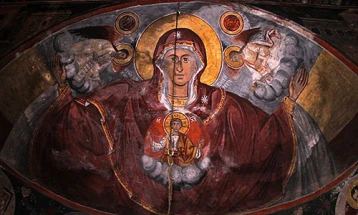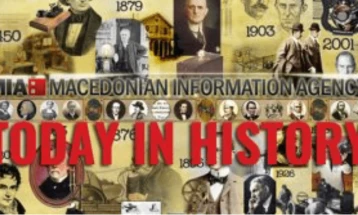
26 May 2024 (MIA)
Macedonian Orthodox Church Calendar
The Holy Martyr Glykeria
The daughter of a governor of Rome, she became poor after her father’s death and went to live in Trajanopolis in Thrace. In the time of the wicked Emperor Antoninus, Glykeria was brought to offer sacrifice to the idol of Zeus. She traced the Cross on her forehead and, when the governor asked her where was her lamp (for they all carried lamps in their hands), Glykeria indicated the Cross on her forehead and said: `This is my lamp!’ At her prayers, the idol was struck by lightning and broken into pieces. The governor was furious with her and commanded that she be thrown into prison. He sealed the door of the prison, intending to starve the maiden to death, but an angel of God appeared to Glykeria and gave her heavenly food. After a certain time, when the governor reckoned that the maiden must have died of hunger, he opened the prison and was astounded to see her in good health, bright and merry. The warder, Laodicius, seeing this marvel, himself confessed Christ the Lord and was at once beheaded. After that Glykeria was thrown into a burning furnace, but she remained untouched by the flames. Standing in the midst of the fire, she praised the Lord, commemorating the wonder with the Three Children in the burning fiery furnace in Babylon. Finally, she was thrown to the lions and, praying to God, this holy maiden gave her soul into the hands of the Lord for whom she had heroically suffered much torture. She suffered with honour in the year 141. Healing myrrh flowed from her relics, which healed the sick of the gravest illnesses.
Catholic Calendar
Saint Philip Neri
Born in 1515 in Florence, he showed the impulsiveness and spontaneity of his character from the time he was a boy. In fact one incident almost cost him his life. Seeing a donkey loaded with fruit for market, the little boy had barely formed the thought of jumping on the donkey’s back before he had done it. The donkey, surprised, lost his footing, and donkey, fruit, and boy tumbled into the cellar with the boy winding up on the bottom! Miraculously he was unhurt. Humility was the most important virtue he tried to teach others and to learn himself. Some of his lessons in humility seem cruel, but they were tinged with humour like practical jokes and were related with gratitude by the people they helped. His lessons always seem to be tailored directly to what the person needed. One member who was later to become a cardinal was too serious and so Philip had him sing the Misere at a wedding breakfast. When one priest gave a beautiful sermon, Philip ordered him to give the same sermon six times in a row so people would think he only had one sermon. Philip was very serious about prayer, spending hours in prayer. He was so easily carried away that he refused to preach in public and could not celebrate Mass with others around. But he when asked how to pray his answer was, “Be humble and obedient and the Holy Spirit will teach you.” Philip died in 1595 after a long illness at the age of eighty years.







